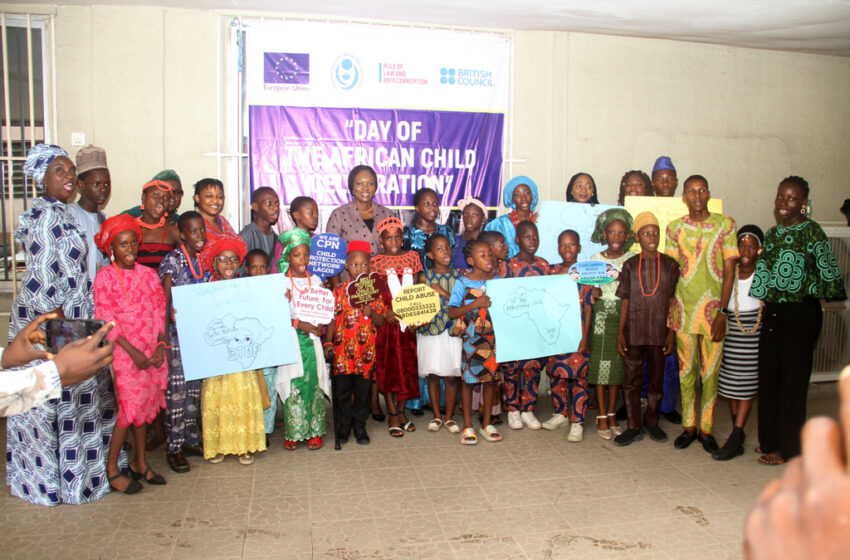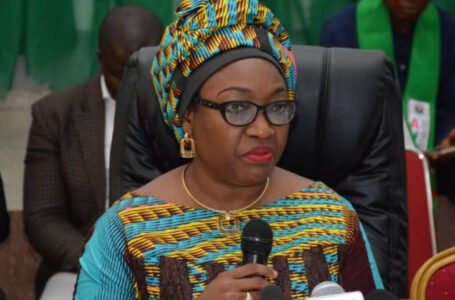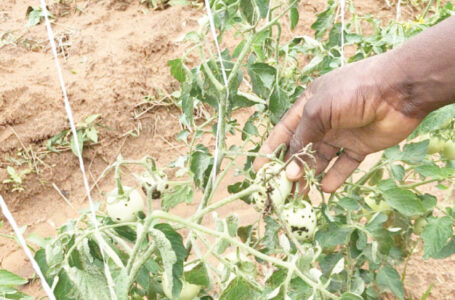Witness narrates how Ex-HoS, allies diverted public funds to private companies in court
CPN charges govts on child protection, quality education


By Ibrahim Adeleke
Child Protection Network (CPN), Lagos chapter has called on the governments at all levels and other stakeholders to effectively prevent, protect and assist children who are victims or at risk of harmful practices.
According to the body, they should look critically at the challenges they are currently facing, address the harmful practices and list strategically steps that could be taken to improve the protection of children against harmful practices in Nigeria and Africa.
Speaking at the Day of the African Child (DAC) 2022 Celebration, organised by the body at Bimbo Odukoya Foundation, State Secretariat of CPN, Ilupeju, Lagos, the CPN Lagos State Coordinator, Aderonke Oyelakin, noted that Nigerian children still experience harmful practices and so other children in Africa.
“CPN goal is towards the protection and assistance of children who are at risk and victims of harmful practices in Nigeria and we use this day to call on all relevant stakeholders who are working in the area of children’s rights on the continent in order to reinforce their efforts in addressing the obstacles related to harmful practices affecting children.
“CPN Lagos is a makeup of NGOs whose primary focus is of the welfare/protection of children; so to reemphasize that we recognise the importance of the Day of the African Child (DAC).
“CPN is across the 20 LGA of the state, our core is to prevent and respond to children related issues and provide apt and efficient services.”
Identifying the harmful practices against children, Oyelakin said: “Harmful practices include, amongst other forms of abuse, child marriage, forced marriage, FGM, breast flattening, hate crimes, child abuse linked to faith or belief and so-called honour-based abuse.
“Harmful practices are persistent practices and behaviours that are grounded on discrimination based on sex, gender, age and other grounds as well as multiple and/or intersecting forms of discrimination that often involve violence and cause physical and/or psychological harm or suffering. Harmful traditional practices are particular forms of violence against women and girls which are defended based on tradition, culture, religion, or superstition by some community members.
“In a nutshell, harmful practices refer to behaviours and practices which are harmful to people’s physical and mental health.’
A variety of harmful practices exist, including ‘FGM, child and forced marriage, virginity testing and related practices, extreme dietary restrictions, including during pregnancy (force-feeding, food taboos), binding, scarring, branding/infliction of tribal marks, corporal punishment, stoning, violent initiation rites, widowhood practices, accusations of witchcraft, infanticide, incest and body modifications that are performed for beauty or marriageability of girls and women.
“The effects of these practice cannot be overrated. Harmful practices rob children especially the girl child of their childhood, deny them the chance to determine their future and threaten the well-being of individuals, families and societies. Harmful practices cause physical and/or emotional abuse. All forms of harmful practices are likely to cause harm and suffering. Harmful practices have negative consequences on children and they are likely to cause physical, psychological, economic and social harm and/or violence and limitations on children’s capacity to participate fully in society or develop and reach their full potential. Harmful practices are mostly imposed on children by their family, community members and society at large.
“Harmful practices affect the child’s physical and mental health in the short and longer-term, impair their ability to learn and socialize and impact their transition to adulthood with adverse consequences later in life which we refer to as ACE- Adverse Childhood Experiences.”
Mranwhile, she noted that progress has been made in some African countries but it is still not enough.
“Until we have zero tolerance of any such practices on our children in Africa.”
Speaking on the theme of the celebration “Eliminating Harmful Practices Affecting Children: Progress on Policy & Practice since 2013”, Oyelakin said it was selected by the African Committee of Experts on the Rights and Welfare of the Child (ACERWC) for the celebration of the DAC in 2022.
She, therefore strongly advocated for proper education of children, saying: “Educating children lifts them out of poverty”.
Narrating the genesis of DAC celebration, the CPN coordinator said: “On June 16, 1976, nearly ten thousand black students from Soweto, South Africa, marched the streets to protest the poor quality of their education. They marched as a way to demonstrate their disapproval of the Black Education Act, which segregated students based on their race.
“Since 1991, the Day of the African Child has been celebrated on June 16 to commemorate those killed during the Soweto Uprising in South Africa, and to recognize the courage of the students who marched for their right to an education.
“On this account, CPN Lagos emphasizes that the Day of the African Child is an ample opportunity to raise awareness for the ongoing need to improve the quality and access to free education of children living across Africa.”
She noted that out of the 57 million primary school age children currently out of school around the world, over half are from sub-Saharan Africa.
Oyelakin, who identified various reasons why children go uneducated, said their parents may not be able to afford school fees, adding that economic hardship, the distance to the nearest school which may be too far, or early marriage which may keep girls especially from the classroom and many more barriers to education have an enormous impact on children, especially girls.
“Children are active members of society and they need the support of everybody to achieve their potential.
“Though progress has been made since the Soweto Uprising, 1 in 10 children is still missing from the classroom. This is a call to all child advocates out there as we all know that much more work needs to be done to ensure all children receive quality education.”











